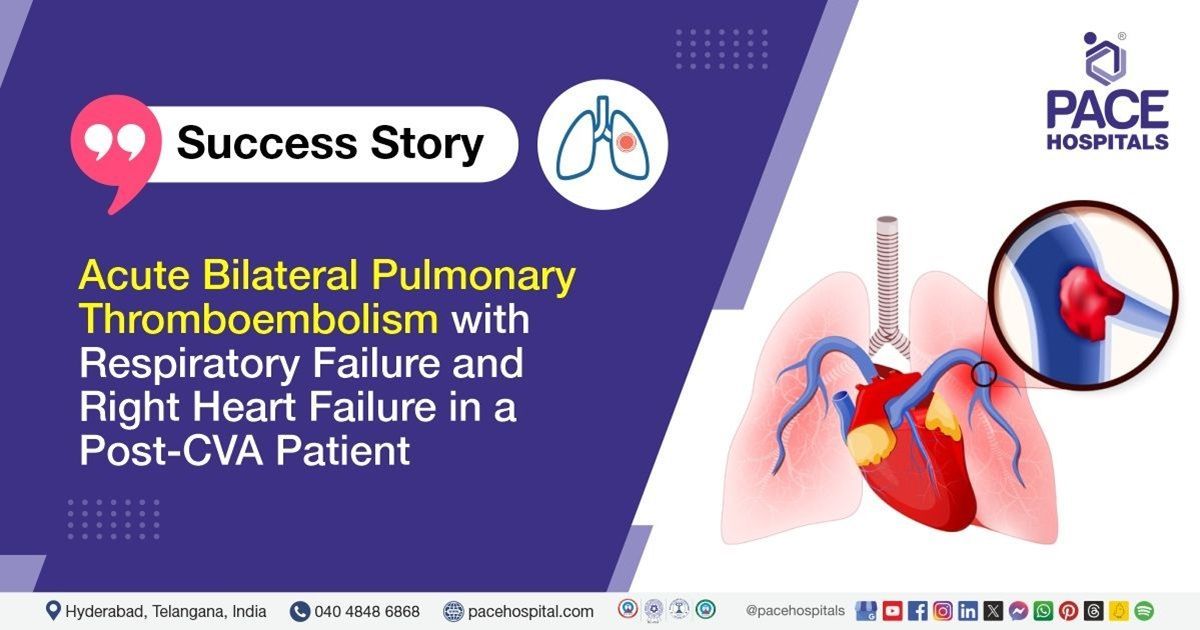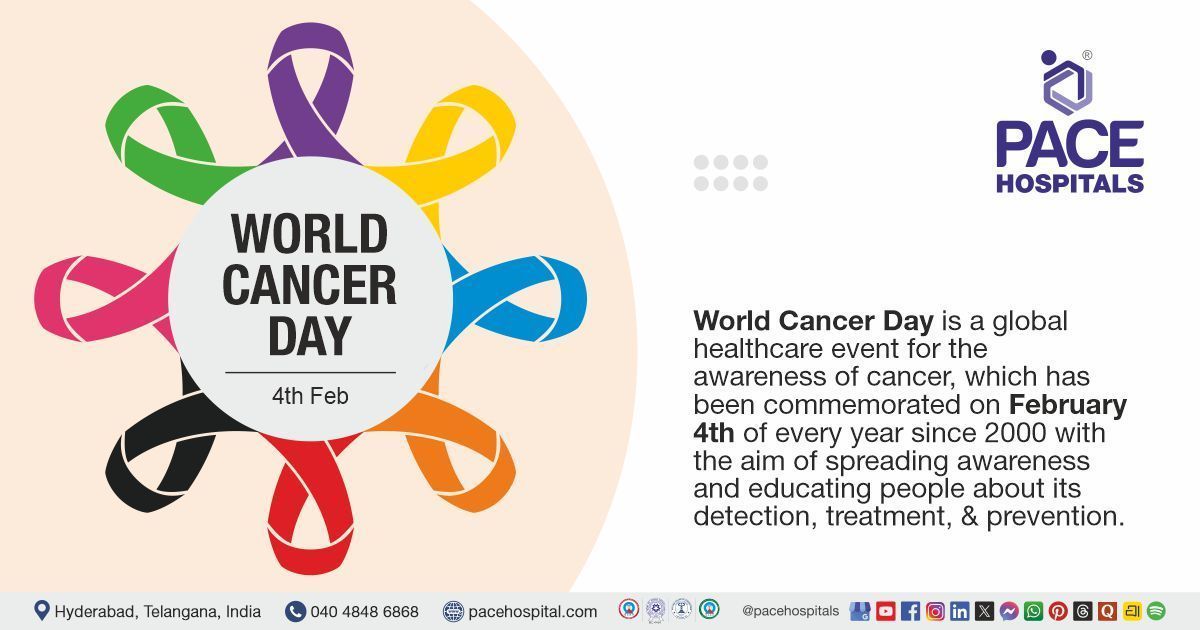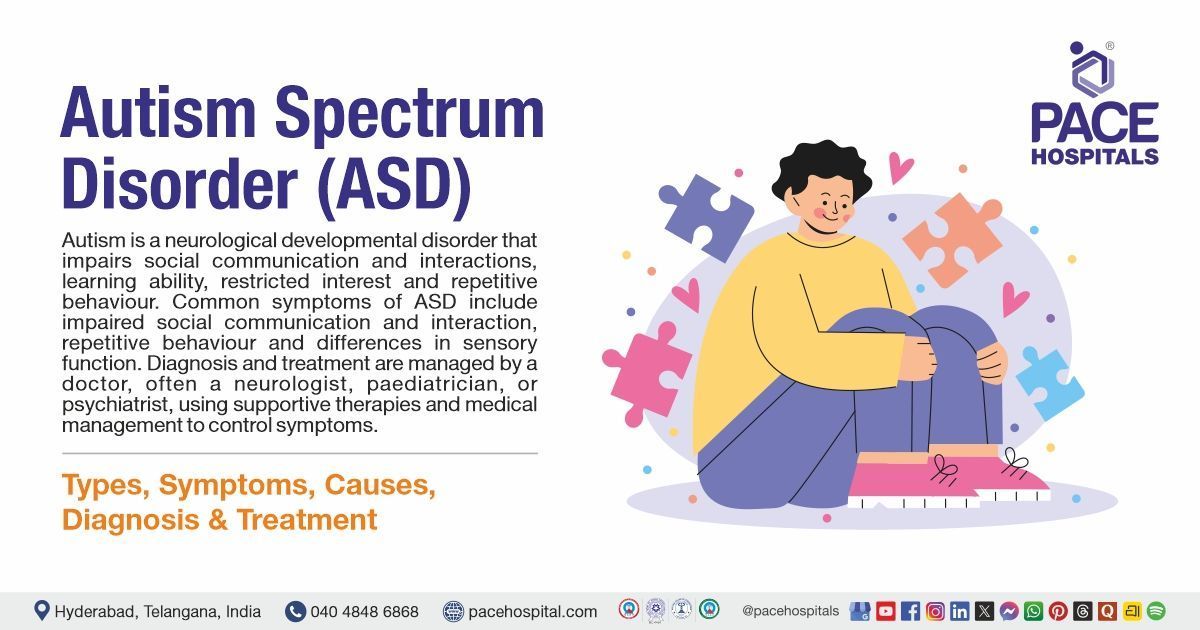Acute Bilateral Pulmonary Thromboembolism with Respiratory Failure and Right Heart Failure in a Post-CVA Patient
PACE Hospitals
A 55- year- old male patient approached PACE Hospitals, Hitech city, Hyderabad with a history of Cerebrovascular accident (CVA) and the chief complaints of shortness of breath, dryness of the throat and cough with scanty expectoration for the last 15 days. He was treated with nebulization and antiplatelet therapy to manage acute respiratory failure and acute pulmonary thromboembolism associated with heart failure.
Past medical history
The patient was a known case of cerebrovascular accident with right sided hemiparesis, currently on treatment with anti-platelet agents along with some non-allopathic medicines. It is understood that the symptoms have become worse over the past 15 days since he stopped taking the medications. He was not a known case of
hypertension or
diabetes mellitus and had no past history of tuberculosis. Streaky hemoptysis of 1-2 episodes happened in the last 15 days. The patient had quit his smoking habit five years ago.
Present medical illness
The 55-year-old male patient visited PACE Hospitals, Hyderabad with complaints of shortness of breath on exertion for the last 4-5 months which had increased in severity for the last 15 days. The patient also complained of dryness of the throat and cough with scanty expectoration for the last 15 days. At the time of admission, the patient was having severe respiratory distress. Considering the severity of his breathing issues, he was admitted to the intensive care unit of the pulmonology department at PACE Hospitals, Hyderabad.
Upon detailed assessment, he was found to be with progressed grade of shortness of breath from grade 3 to grade 4 on the MmRC scale (Modified medical Research Council). Although not associated with wheezing or chest tightness at the time of admission, swelling in the legs was increasing when the patient walk. The patient was not found with any weight loss, loss of appetite or joint pains or fever at the time of admission.
Diagnosis
As the patient was severely under respiratory distress, he was admitted to the ICU and was kept under oxygen support at about 6-8L/Min.
The patient had his CT Pulmonary angiogram (CTPA) done at another hospital, which suggested bilateral segmental and subsegmental pulmonary thromboembolism. A Doppler study of both lower limbs and a neck vein doppler study reports were normal. Other investigations showed elevated D-dimer, NTProBNP and 2D echo showed a dilated right atrium and right ventricle with severe pulmonary arterial hypertension (PAH) and severe tricuspid regurgitation (TR). All other blood investigations were within normal limits.
Considering the above investigations and imaging test results, the patient was diagnosed with “Acute bilateral pulmonary thromboembolism with Acute respiratory failure and Right heart failure associated with cerebrovascular accident.”
Acute pulmonary thromboembolism is frequently encountered in clinical practice, and its presentation can vary, which makes diagnosing it a challenge. Pulmonary embolism (PE) happens when a blood clot forms in another part of the body and then blocks blood flow in the pulmonary artery or its branches. A blood clot typically forms in the deep veins, often in the lower limbs, in a condition known as deep vein thrombosis (DVT). Pulmonary embolism (PE) usually happens when a fragment of this blood clot breaks loose and travels into the pulmonary circulation.
The inability of the lungs to supply the blood with enough oxygen causes respiratory failure, making it difficult to breathe independently. Acute respiratory failure can occur suddenly without much warning and is often the result of a disease or injury affecting breathing, such as pneumonia, pulmonary thromboembolism, cerebrovascular accident, or a lung or spinal cord injury.
In this case, the patient was suffering with acute pulmonary thromboembolism and had a CVA history which might have led to acute respiratory failure. The patient was admitted to the intensive care unit for further management of his deteriorating respiratory distress and heart failure.
Treatment
Upon admission into the intensive care unit, the consultant interventional pulmonologist from PACE Hospitals, Dr. Pradeep Kiran Panchadi had kept the patient on oxygen support initially with 6-8 lit/min. Consultant nephrologist and transplant physician, Dr. A. Kishore Kumar’s opinion was taken as the patient had his urine culture test positive for the growth of E. Coli bacteria but with no symptoms of urinary tract infection. Confirming the E. Coli growth as asymptomatic bacteriuria, no treatment was provided at the moment. Keeping in mind about the complication of past cerebrovascular accident and throat dryness in the patient, consultant neurophysician and the consultant ENT Surgeon were consulted, and their opinions were taken before starting the antiplatelet therapy for his thromboembolism condition.
Upon the patient being stable with oxygen demand, he was shifted to the general ward from the intensive care unit. Antiplatelet therapy with low molecular weight (LMW) anticoagulants was initiated to treat acute bilateral pulmonary thromboembolism. Diuretics were given to manage pedal edema, nebulization and oxygen support were given to treat acute respiratory distress.
Aftermath
The symptoms of the conditions started improving quickly after the treatment and the patient was kept under continuous monitoring for vitals, respiratory rate in specific. Incentive spirometry, breathing exercises and physiotherapy for both the lower limbs were recommended to the patient. The patient was discharged once he improved clinically, with clear orientation and a relatively stable condition.
Discharge notes
The patient was prescribed anticoagulants, diuretics, statins, nebulization, anti-histamines, proton pump inhibitors and anticonvulsants. He was also advised to consume foods high in protein and to get PT, INR and APTT tests done, once every 15 days.
The patient was told to get review after 30 days by Dr. Pradeep Kiran in the pulmonary medicine OPD with RFT, LFT, CTPA, 2D Echo and NT ProBNP reports. A review on the same day with Dr. Sravan in the cardiology OPD with the above reports was also mentioned to the patient.
Relation between Acute pulmonary thromboembolism, Acute respiratory failure and Right heart failure
Acute bilateral pulmonary thromboembolism (PTE) with respiratory failure is a highly life-threatening condition that occurs when both pulmonary arteries are suddenly blocked by blood clots, leading to impaired blood flow and gas exchange in the lungs. This blockage significantly impacts the right side of the heart, increases pulmonary vascular resistance, and can cause acute right ventricular (RV) dysfunction or failure. The severity of PTE can vary from mild, often unnoticed cases to massive PTE that results in unstable blood circulation and potential death.
Share on
Request an appointment
Fill in the appointment form or call us instantly to book a confirmed appointment with our super specialist at 04048486868











